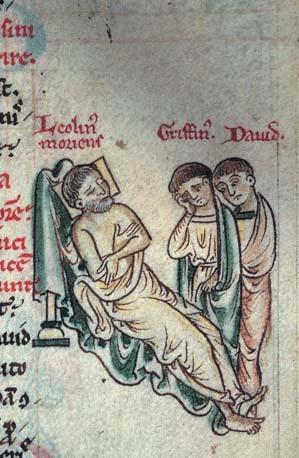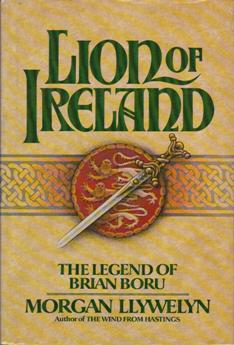
The history of what is now Wales begins with evidence of a Neanderthal presence from at least 230,000 years ago, while Homo sapiens arrived by about 31,000 BC. However, continuous habitation by modern humans dates from the period after the end of the last ice age around 9000 BC, and Wales has many remains from the Mesolithic, Neolithic, and Bronze Age. During the Iron Age the region, like all of Britain south of the Firth of Forth, the culture had become Celtic, with a common Brittonic language. The Romans, who began their conquest of Britain in AD 43, first campaigned in what is now northeast Wales in 48 against the Deceangli, and gained total control of the region with their defeat of the Ordovices in 79. The Romans departed from Britain in the 5th century, opening the door for the Anglo-Saxon settlement. Thereafter, the culture began to splinter into a number of kingdoms. The Welsh people formed with English encroachment that effectively separated them from the other surviving Brittonic-speaking peoples in the early middle ages.

Llywelyn the Great was a King of Gwynedd in north Wales and eventually "Prince of the Welsh" and "Prince of Wales". By a combination of war and diplomacy he dominated Wales for 45 years.

The Lion King II: Simba's Pride is a 1998 American animated direct-to-video musical romantic drama film. It is the sequel to Disney's 1994 animated feature film, The Lion King, with its plot influenced by William Shakespeare's Romeo and Juliet, and the second installment in The Lion King trilogy. According to director Darrell Rooney, the final draft gradually became a variation of Romeo and Juliet.

The Kingdom of Gwynedd was a Welsh kingdom and a Roman Empire successor state that emerged in sub-Roman Britain in the 5th century during the Anglo-Saxon settlement of Britain.

Welsh nationalism emphasises and celebrates the distinctiveness of Welsh culture and Wales as a nation or country. Welsh nationalism may also include calls for further autonomy or self determination which includes Welsh devolution, meaning increased powers for the Senedd, or full Welsh independence.

A Royal Badge for Wales was approved in May 2008. It is based on the arms borne by the thirteenth-century Welsh prince Llywelyn the Great, with the addition of St Edward's Crown atop a continuous scroll which, together with a wreath consisting of the plant emblems of the four countries of the United Kingdom, surrounds the shield. The motto which appears on the scroll, PLEIDIOL WYF I'M GWLAD, is taken from the National Anthem of Wales and is also found on the Welsh designs for £1 coins minted from 1985 until 2000. The badge formerly appeared on the covers of Assembly Measures; since the 2011 referendum, it now appears on the cover of Acts passed by the Senedd and its escutcheon, ribbon and motto are depicted on the Welsh Seal.

Madog ap Llywelyn was the leader of the Welsh revolt of 1294–95 against English rule in Wales and proclaimed "Prince of Wales". The revolt was surpassed in longevity only by the revolt of Owain Glyndŵr in the 15th century. Madog belonged to a junior branch of the House of Aberffraw and was a distant relation of Llywelyn ap Gruffudd, the last recognised native Prince of Wales.
In 1980 the British and Irish Lions rugby union team toured South Africa. The tour was not a success for the Lions, as they lost the first three tests before salvaging some pride with a win in the fourth. The team did however win all their 14 non-international matches. The Lions were captained by Bill Beaumont.

Bard: The Odyssey of the Irish is a 1984 historical fantasy novel by Morgan Llywelyn. It depicts the migration of Galicians to Ireland, led by Amergin the bard and the Sons of the Mil. It is loosely based on the Early Irish Lebor Gabála Érenn or The Book of Invasions found in several medieval manuscripts.
Morgan Llywelyn is an American-Irish historical interpretation author of historical and mythological fiction and historical non-fiction. Her interpretation of mythology and history has received several awards and has sold more than 40 million copies, and she herself is recipient of the 1999 Exceptional Celtic Woman of the Year Award from Celtic Women International.
Michael Peter Scott is an Irish writer of science fiction, fantasy, horror, and, under the name Anna Dillon, romance novels. He is also a collector and editor of folklore. Scott is best known for his The Secrets of the Immortal Nicholas Flamel book series.

Grania: She-King of the Irish Seas is a 1986 historical fiction novel about Grace O'Malley, the so-called "Sea Queen of Connemara", by American-born Irish author Morgan Llywelyn. Llywelyn's novel is a heavily fictionalized account of O'Malley's life, with the author having created characters as needed for the plot of the story. The novel was the basis for the 2007 Broadway musical The Pirate Queen.
The CBI Book of the Year Awards, previously known as the Bisto Book of the Year Awards, are literary awards presented annually in the Republic of Ireland to writers and illustrators of books for children and young people. The Awards are run by Children's Books Ireland (CBI) and are open to authors and illustrators born or resident in Ireland; books may be written in English or Irish. Many bestselling, internationally renowned authors have won a "Bisto", including Eoin Colfer, John Boyne and several times winner Kate Thompson.

Lion of Ireland, by the American-Irish author Morgan Llywelyn, is a novel about the life of the Irish hero and High King Brian Boru.

Donnchadh mac Briain, son of Brian Bóruma and Gormflaith ingen Murchada, was King of Munster.

The history of Gwynedd in the High Middle Ages is a period in the History of Wales spanning the 11th through the 13th centuries. Gwynedd, located in the north of Wales, eventually became the most dominant of Welsh polities during this period. Contact with continental courts allowed for Gwynedd to transition from a petty kingdom into an increasingly sophisticated principality of seasoned courtiers capable of high level deplomacy and representation; not only with the Angevine kings, but also the king of France and the Papal See. Distinctive achievements in Gwynedd include further development of Medieval Welsh literature, particularly poets known as the Beirdd y Tywysogion associated with the court of Gwynedd; the reformation of bardic schools; and the continued development of Cyfraith Hywel. All three of these further contributed to the development of a Welsh national identity in the face of Anglo-Norman encroachment of Wales.

Llywelyn is a Welsh personal name, which has also become a family name most commonly spelt Llewellyn. The name has many variations and derivations, mainly as a result of the difficulty for non-Welsh speakers of representing the sound of the initial double ll.
Malcolm II of Scotland has been depicted in historical fiction.
A patronymic surname is a surname originated from the given name of the father or a patrilineal ancestor. Different cultures have different ways of producing patronymic surnames.











